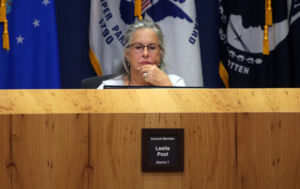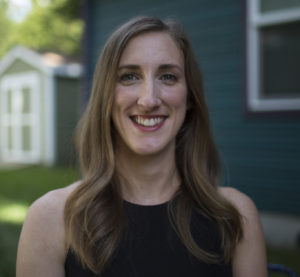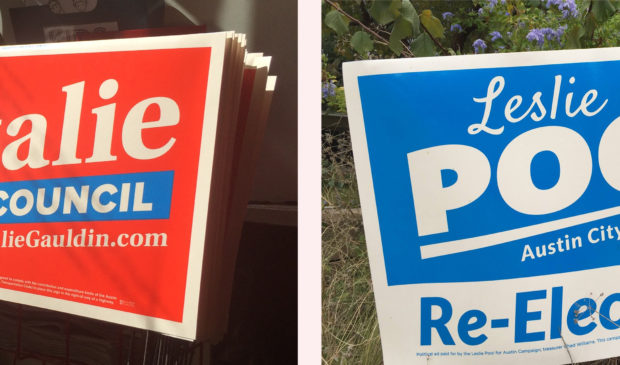More than a yard sign: Differing ideas about how District 7 should grow
Thursday, September 15, 2016 by
Audrey McGlinchy, KUT You could classify Austin’s District 7 as the “middle district” – it falls smack dab between the city’s lowest- and highest-income districts, with an annual median family income around $74,000. Half (around 56 percent) of district residents rent their homes. It’s also geographically central and narrow, stretching from the city’s North Loop area to the boundaries of Pflugerville.
City Council Member Leslie Pool represents District 7. In the November election for her seat, Pool faces only one challenger: Natalie Gauldin, a former teacher and current technical writer.
To better inform voters, we thought we would focus on three of the big issues of the last year-and-a-half of Austin’s first 10-1 Council: the transportation bond, mandatory fingerprinting and the homestead tax exemption. We reviewed Council members’ views on each matter and asked non-incumbents how they would have voted them. Then we added one more category: pet projects. We asked incumbents to name a pet project and non-incumbents to tell us what they would like to focus on if elected.
It’s all part of a series we’re calling “More Than a Yard Sign.” The previous three installments, which focus on districts 2, 4 and 6, are available here.
Leslie Pool

A former employee of both state and county government, Leslie Pool has spent her time on the dais advocating for environmental protections.

Early on in the bond discussion, Pool joined Council Member Greg Casar in proposing amendments to Mayor Steve Adler’s original plan for the bond. Some of those amendments were included in the final plan, including reduced spending on corridor projects and more money for sidewalks and safer routes to schools.

At a Council discussion, Pool questioned why Uber had agreed to the fingerprint mandate in Houston but not in Austin. “Clearly, the community would like to see this additional public safety,” said Pool.

While Council approved a 2 percent increase to the city’s homestead exemption this year – bringing it to 8 percent – Pool, it appears, would have liked a larger increase. In 2015, she supported getting to a 20 percent exemption in four years.

When reflecting on the last nearly two years on the dais, Pool holds up Council’s approval of the Austin Community Climate Plan as a memorable moment. “It was a huge undertaking by staff and the community in the years before we approved it last year,” she said.
Natalie Gauldin

A former elementary school teacher, Natalie Gauldin was born and raised in District 7. Gauldin co-founded Friends of the Grove in support of a proposed, and contentious, mixed-use development.

“I think we need to invest in infrastructure, and this is one step,” said Gauldin, explaining that the city has failed to prepare for recent growth and that this bond package is a good start.

Gauldin said that requiring ride-hailing drivers to be fingerprinted – a rule that companies Uber and Lyft say forced them out of the city – created a concern among other local businesses about “unfriendly” regulations.
“The business community is asking, ‘What is Austin doing?’ I can go in here and start my business, and then a few years later, they might pile on additional regulations that make it so it’s not really feasible for me to continue in that city,” said Gauldin.

“It’s not really making the type of impact that (residents) would hope,” said Gauldin. Council members raised the homestead exemption to 8 percent this year, up from 6 percent the year before. Gauldin said this larger exemption had too big of an impact on the city’s budget. “You pull money away typically from the services that help the people who have the greatest need,” she said.

Gauldin said that, if elected, she would be heavily involved in CodeNEXT, the city’s rewrite of the Land Development Code. A denser district, Gauldin said, is what she wants to see: “Really give people the opportunity to get out of their cars, stop that sprawl … and make life affordable for more people.”
This story has been changed since publication to clarify Gauldin would prioritize affordability, not density, as originally reported. It was produced as part of the Austin Monitor’s reporting partnership with KUT. Photos by Gabriel Crisóver Pérez and Jorge Sanhueza-Lyon.
The Monitor’s work is made possible by donations from the community. Though our reporting covers donors from time to time, we are careful to keep business and editorial efforts separate while maintaining transparency. A complete list of donors is available here, and our code of ethics is explained here.
You're a community leader
And we’re honored you look to us for serious, in-depth news. You know a strong community needs local and dedicated watchdog reporting. We’re here for you and that won’t change. Now will you take the powerful next step and support our nonprofit news organization?



















